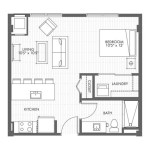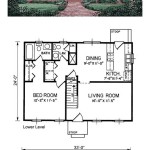What is a Floor Plan? Understanding its Essential Aspects
A floor plan is a detailed drawing or diagram that illustrates the layout of a building or a specific floor level within a structure. It provides a comprehensive overview of the space's dimensions, room arrangement, and other architectural features. Floor plans are essential tools for architects, builders, interior designers, and anyone involved in the planning or remodeling of a building.
Floor plans can vary in complexity depending on the scale and purpose of the project. Basic floor plans typically include the following essential elements:
- Walls and Partitions: Lines indicating the perimeter of each room and any interior walls or partitions.
- Doors and Windows: Symbols or lines representing the location and type of doors and windows within each room.
- Furniture and Fittings: Simple outlines or symbols indicating the placement of furniture, fixtures, and appliances within the space.
- Dimensions: Measurements of the room's length, width, and height.
- Scale: A statement indicating the relationship between the drawing and the actual size of the space.
More detailed floor plans may also include additional information such as:
- Electrical and Plumbing Systems: Lines or symbols indicating the location of electrical outlets, switches, plumbing fixtures, and pipes. li>Structural Elements: Beams, columns, and other structural elements within the space.
- Notes and Specifications: Textual descriptions or notes providing additional information about the space, such as materials used, finishes, or special requirements.
Floor plans are typically created using specialized software tools or drafted by hand. They are often used in conjunction with other architectural drawings, such as site plans, elevations, and sections, to provide a complete representation of a building or space. Floor plans are essential for:
- Planning and Design: Architects and designers use floor plans to develop the initial layout and design of a building or space.
- Construction: Builders use floor plans as a guide during the construction process, ensuring that the structure is built according to the intended design.
- Interior Design: Interior designers use floor plans to計画 the placement of furniture, fixtures, and other elements within a space.
- Renovation and Remodeling: Floor plans are essential for planning and executing renovations or remodeling projects, ensuring that changes are made in a logical and efficient manner.
Understanding the essential aspects of floor plans is crucial for anyone involved in the planning, design, or construction of buildings and spaces. Floor plans provide a clear and concise representation of the layout and features of a space, enabling architects, builders, and interior designers to make informed decisions about the design and utilization of the space.

Sample Floorplan Floor Plan Template

Floor Plan Wikipedia

Create Professional 2d And 3d Floor Plans

Sample Floor Plan Image With The Specification Of Diffe Room Sizes Scientific Diagram

Free Editable Floor Plan Examples Edrawmax

Ready To Use Sample Floor Plan Drawings Templates Easy Blue Print Floorplan Ezblueprint Com

Example Of An Architectural Floor Plan Scientific Diagram

Free Editable Floor Plan Examples Edrawmax

Ready To Use Sample Floor Plan Drawings Templates Easy Blue Print Floorplan Ezblueprint Com

Planup Example 2d Plans
Related Posts








